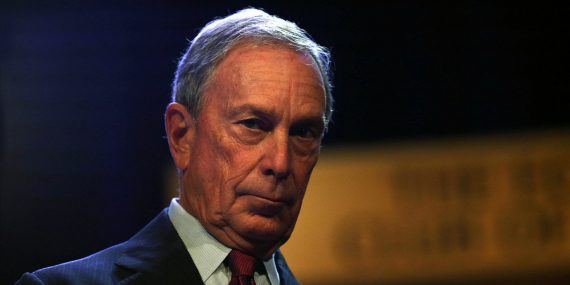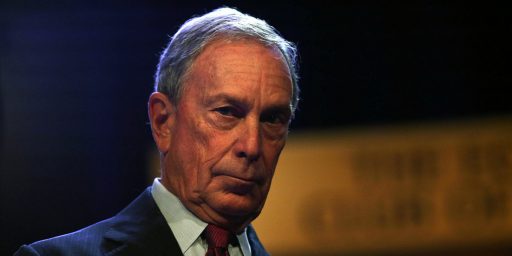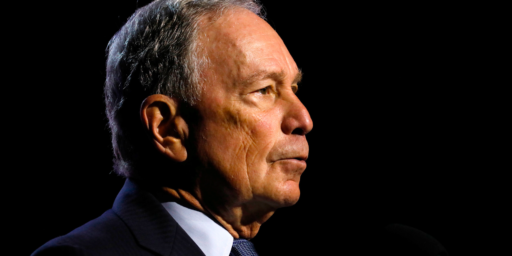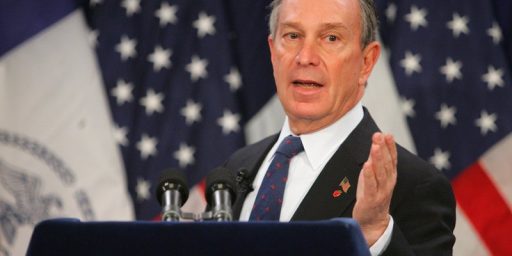Michael Bloomberg Apparently Thinking Of Running For President For Some Reason
We're in another Presidential election cycle so it must be time to speculate about Michael Bloomberg again.
As we head into the final week before the beginning of voting for the 2016 election cycle, The New York Times is taking its turn to report what seems to have become a quadrennial event in American politics, the speculation that former New York City Mayor Michael Bloomberg will launch an independent bid for the White House:
Michael R. Bloomberg has instructed advisers to draw up plans for a potential independent campaign in this year’s presidential race. His advisers and associates said he was galled by Donald J. Trump’s dominance of the Republican field, and troubled by Hillary Clinton’s stumbles and the rise of Senator Bernie Sanders of Vermont on the Democratic side.
Mr. Bloomberg, the billionaire former mayor of New York City, has in the past contemplated running for the White House on a third-party ticket, but always concluded he could not win. A confluence of unlikely events in the 2016 election, however, has given new impetus to his presidential aspirations.
Mr. Bloomberg, 73, has already taken concrete steps toward a possible campaign, and has indicated to friends and allies that he would be willing to spend at least $1 billion of his fortune on it, according to people briefed on his deliberations who spoke on the condition of anonymity because they were not authorized to discuss his plans. He has set a deadline for making a final decision in early March, the latest point at which advisers believe Mr. Bloomberg could enter the race and still qualify to appear as an independent candidate on the ballot in all 50 states.
He has retained a consultant to help him explore getting his name on those ballots, and his aides have done a detailed study of past third-party bids. Mr. Bloomberg commissioned a poll in December to see how he might fare against Mr. Trump and Mrs. Clinton, and he intends to conduct another round of polling after the New Hampshire primary on Feb. 9 to gauge whether there is indeed an opening for him, according to two people familiar with his intentions.
His aides have sketched out a version of a campaign plan that would have the former mayor, a low-key and cerebral personality, give a series of detailed policy speeches, backed by an intense television advertising campaign that would introduce him to voters around the country as a technocratic problem-solver and self-made businessman who understands the economy and who built a bipartisan administration in New York.
Mr. Bloomberg would face daunting and perhaps insurmountable obstacles in a presidential campaign: No independent candidate has ever been elected to the White House, and Mr. Bloomberg’s close Wall Street ties and liberal social views, including his strong support for abortion rights and gun control, could repel voters on the left and right.
But his possible candidacy also underscores the volatility of a presidential race that could be thrown into further turmoil by a wild-card candidate like Mr. Bloomberg.
If Republicans were to nominate Mr. Trump or Senator Ted Cruz of Texas, a hard-line conservative, and Democrats chose Mr. Sanders, Mr. Bloomberg — who changed his party affiliation to independent in 2007 — has told allies he would be likely to run.
Edward G. Rendell, the former governor of Pennsylvania and a past Democratic National Committee chairman, said he believed Mr. Bloomberg could compete in the race if activist candidates on the left and right prevailed in the party primaries.
“Mike Bloomberg for president rests on the not-impossible but somewhat unlikely circumstance of either Donald Trump or Ted Cruz versus Bernie Sanders,” said Mr. Rendell, a close ally of Mrs. Clinton’s who is also a friend of Mr. Bloomberg’s. “If Hillary wins the nomination, Hillary is mainstream enough that Mike would have no chance, and Mike’s not going to go on a suicide mission.”
In a three-way race featuring Mr. Sanders and Mr. Bloomberg, Mr. Rendell said he might back the former New York mayor.
“As a lifelong Democrat, as a former party chairman, it would be very hard for me to do that,” he said. “But I would certainly take a look at it — absolutely.”
Mr. Bloomberg declined to comment on his interest in the 2016 race, and most of his associates would speak only on the condition that they not be named. Mr. Bloomberg is irked by the perception that he has toyed too often with running for national office, according to several associates, and is said to be wary of another public flirtation.
At the same time, these associates said, he has grown more frustrated with what he sees a race gone haywire. A longtime critic of partisan primary elections, Mr. Bloomberg has lamented what he considers Mrs. Clinton’s lurch to the left in her contest against Mr. Sanders, especially her criticism of charter schools and other education reforms that he pushed as mayor and has continued to support since leaving office.
At a dinner party late last fall at the home of Roger C. Altman, an investment banker and former deputy Treasury secretary, Mr. Bloomberg delivered a piquant assessment of Mrs. Clinton as a presidential candidate.
In the presence of Mr. Altman, a longtime supporter of Mrs. Clinton and her husband, former President Bill Clinton, Mr. Bloomberg described her as a flawed politician, shadowed by questions about her honesty and the continuing investigation into her email practices as secretary of state, according to two people in attendance.
The outcome of that investigation, Mr. Bloomberg said, was anyone’s guess.
Setting a March deadline for making a decision allows Mr. Bloomberg to see how Mrs. Clinton and the more mainstream Republican candidates fare in the early primaries. And because of his vast wealth, there is no downside in laying the groundwork for a possible campaign, even if he ultimately decides against it.
Even a victory by Mrs. Clinton in the Democratic primaries might not preclude a bid by Mr. Bloomberg, his associates said, if he believed she had been gravely weakened by the contest.
Mr. Bloomberg’s brain trust has examined previous third-party efforts dating to Theodore Roosevelt in 1912, giving closest attention to the campaigns of John Anderson in 1980 and H. Ross Perot in 1992.
It is unclear whether Mr. Bloomberg would be more likely to draw support from a Democrat, like Mr. Sanders or Mrs. Clinton, or a conservative Republican.
While Mr. Bloomberg supports many of the Democratic Party’s social policies, he has been a fierce defender of the financial services industry, which is unpopular with many liberals, and enacted aggressive policing policies in New York City that are anathema to left-leaning voters.
And when he first ran for mayor in 2001, he did so as a Republican. But he has also poured energy and money into advocating policies that conservative Republicans detest, most notably gun control and immigration reform.
Mr. Bloomberg has seen the Mr. Trump’s campaign rhetoric on immigration as especially distasteful. But in an interview with ABC News that aired last weekend, Mr. Trump said he would welcome a presidential campaign by Mr. Bloomberg, whom he called “a friend” and “a great guy.”
Mr. Bloomberg, he predicted, would “take a lot of votes away from Hillary.”
Alan Patricof, a financier and longtime donor to the Clintons who is also friendly with Mr. Bloomberg, said it would be “a terrible thing” for the Democratic Party’s prospects of winning the White House if the former mayor ran as an independent.
“If it was President Trump or President Bloomberg, I’d certainly rather have President Bloomberg,” Mr. Patricof said. “But it certainly can’t help the Democrats.”
This isn’t the first time that Bloomberg’s name has come up in connection with a potential independent bid for the Presidency, of course. The potential for a Bloomberg run in the 2008 Presidential election was being discussed as early as March 2007, but nothing materialized beyond speculation in New York City newspapers and among various political pundits. The idea was floated again during the run up to the 2012 election cycle and, once again, the speculation appeared to be little more than the fantasies of various pundits in the Acela corridor. This time around, I suppose we are supposed to believe that the speculation is more serious given the fact that we’ve already seen so much in this race that would have been unexpected even a year ago, from the rise of Donald Trump to the top of the Republican field even as we enter the final week before the Iowa Caucuses to the success of Vermont Senator Bernie Sanders. In that kind of environment, the idea of a Bloomberg independent bid for the White House doesn’t sound quite as insane as it may have eight or four years ago, that means it makes any more sense than it has in the past when you really look at the details.
Even if Bloomberg is willing to spend a billion dollars on a campaign, it’s difficult to see how an independent bid for the White House would have any more of a chance for success in 2016 than it would have in 2012 or 2008, or how Bloomberg is suddenly now a better candidate than he seemed to be in the past. For one thing, running as an independent is a far more difficult process than running as a candidate of a major party that already has access to the ballot in all fifty states. In many states, for example, getting on the ballot as an independent or as part of a new party requires meeting ballot access requirements far more stringent than those placed on candidates of the major political parties. Bloomberg may believe that this is a problem that can be solved simply by throwing his vast fortune into the pot, but that isn’t necessarily the case and if he’s unable to gain access to the ballot in all but a handful of states then his campaign would be utterly pointless.
In addition to the logistics, and as I noted four years ago, there just doesn’t seem to be any more of a reason for a Bloomberg candidacy now than there was back then:
[T]he entire idea of a Bloomberg candidacy seems to begin and end within a few blocks in Lower Manhattan. Unlike the Perot phenomenon in 1992 and 1996, there’s no evidence that American have some great yearning to be led by a short, sometimes grumpy, billionaire from New York City. In fact, I’d bet that large numbers of Americans don’t really know who Bloomberg is. He may be the Mayor of America’s largest city, but he has a far lower public profile that Ed Koch or Rudy Giuliani did during their time in office. Moreover, where exactly would Bloomberg be popular enough to have a significant impact on the election? I don’t see many of the New Yorkers who voted from him three times in a row crossing lines to vote for him instead of Obama, for example. And Michael Bloomberg isn’t going to play well in Peoria. As I said last year, the only place I see any yearning for a Bloomberg candidacy is in the New York-Washington corridor among the punditocracy, for whom the idea of an all-knowing East Coast Technocrat in the White House seems to be very appealing. Or maybe it’s just that they idea appeals to them because it would give them something interesting to write about.
This argument applies equally in 2016. Even in the unlikely even of a Trump v. Sanders race, it’s hard to see where Bloomberg fits in. If he does have an impact, the most likely would seem to be to pull independent-minded voters away from one candidate or the other in marginal states, but that’s unlikely to be enough to get him a majority of the votes in any state, and many not even change the outcome in those states to an appreciable degree. If Clinton were the Democratic nominee, there wouldn’t seem to be any logic for a Bloomberg run at all, but the logistics of an independents bid would require him to enter the race before the outcome of the race for the Democratic nomination may even be clear. Add to this the fact that Bloomberg is now 73 years old, older than Trump and Clinton, and only a year younger than Sanders, and the idea of a Bloomberg campaign just seems unlikely. My guess is that Bloomberg is feeding the speculation about his entry into the race in order to influence the issues that the candidates, and especially the Democratic candidates, are talking about toward things that he has an interest in, such as gun control. Of course, this is 2016 and stranger things have already happened so your guess about the intentions of Michael Bloomberg are as good as mine.





Something liberals and conservatives can agree on, no bloomie!!
Bloomberg–the Lindsay Graham of the Left.
It’s the American Dream: Any billionaire can grow up and become President. It’s what makes America special.
Where’s Alan Keyes?
@Tyrell:
Forget Keyes. It’s well past time to disinter Pat Paulsen.
Aren’t the deadlines for getting yourself on the ballot as an independent coming up soon? And don’t you have to get a certain number of signatures of voters in the state to become qualified for each state?
I suspect the only reason the news media are mentioning this are because of wanting even more of a horse-race and more eyeballs.
Perhaps he is considering a run because he thinks Mrs. Clinton will be indicted?
Slightly OT, I guess, but Trump announced in Iowa today that he could stand in the middle of Fifth Avenue and shoot somebody and he wouldn’t lose any voters.
@CSK: That would depend on who he shot. Black guy, for sure none of his backers would care.
I juse can not help but laugh at the conceit that Clinton is “lurching to the left.” Moving away from her center-right comfort zone toward slight left of center, I could buy.
The summarize the article, as long as the viable options are a center-right corporatist hawk and an authoritarian reactionary corporatist hawk, Bloomberg stays out. But if the Democrats select the center-left economic populist, then there’s an opening for a center-right corporatist.
@Tyrell:
probably somewhere in South Yemen looking for Barack Obama’s birth certificate
My first, gut reaction? “Oh, sh**”
Of course he’s not going to “win”–aka be elected president. That’s hardly the issue here. As we learned from the 2000 election, even an indie candidate with less than 2% of the popular vote can make a difference. And please, @Gromitt Gunn, you can call him a “center-right corporatist” all you like: the fact is that he’d almost certainly draw more votes from Democrats than Republicans. Whatever you may think or I may think, the fact is that he is overwhelmingly viewed (by the media, even by many liberals) as a center-left moderate. That’s his public profile, and that will be how he positions himself should he choose to run. And a lot of voters will believe it, too, just as they believed Romney was a moderate last time despite his running one of the most right-wing campaigns in recent memory.
Now, I’m not saying Bloomberg’s presence would lead to a “President Trump.” But President Rubio or even President Cruz? It’s a real possibility.
Remember, in 1980 John Anderson, despite being an elected Republican who had sought the Republican nomination that year, ended up drawing more votes from Carter than from Reagan. Reagan’s lead over Carter was wide enough that he’d almost certainly have won without Anderson in the race; however, Anderson’s presence did no favors to Carter.
In a fairly close race, these things can matter a lot. And there’s every reason to believe 2016 will be close.
Ah, Michael Bloomberg, the independent candidate that nobody wanted.
The consensus on Twitter seems to be, “What, we didn’t have enough megalomaniac New York billionaires in the race?”
This goes to show how worrying Sanders’s anti-plutocrat following has become for nominal “center-left” Democrats and independents like Bloomberg. He doesn’t run if Clinton wins, but should Sanders win he’d mount an independent bid he couldn’t possibly win just to deliver the Oval Office to the Republican party.
@Kylopod: Bingo. Bloomberg won’t draw off enough Republican votes to make a difference. It’ll be former Clinton supporters.
Strange that it’s always been a question as to whether Sanders supporters would support Clinton in the general, but never the other way around. Bloomberg offers a nice hypothetical to gauge that with.
@Kylopod: of course he would draw off more Democrats than Republicans. The current GOP is a far right reactionary party, and the current Democratic Party is a center-left to center-right coalition party with a minor left fringe. Both Clinton and Bloomberg fall well within that coalition.
If my choices are Trump, Clinton or Bloomberg I vote Johnson
Michael wants to take everybody’s guns away. And their soft drinks.
@Kylopod:
If Bloomberg was the Democratic Party nominee I think he’d win easily.
Frankly, I’d vote for just about any Democrat if only because I believe that there will be at least one, perhaps two, chances to nominate a justice to the Supreme Court. I’d rather have another Kagan or Sotomayor, than another Alito, Thomas or Scalia on the Supreme Court.
@Tillman: I believe the hope is to dissolve the Democratic base and elect another, should it fail to do what it is told during the primary.
There are some things about Mr. Bloomberg that can attract voters: he will not need contributions from influential groups; he seems knowledgeable and well organized; he seems in control and does not act or talk irrationally; crime went down when he was mayor of NYC; he would have the experience and knowledge to make the government more businesslike; he could overhaul the health plan; and I am not aware of any past scandals. The downsides are his stands on personal freedoms (gun ownership, soft drinks). He would have to do an explanation about that.
@Tyrell: “he would have the experience and knowledge to make the government more businesslike;”
I sincerely hope that every time a Republican repeats this hoary canard, the Democratic candidate will say “The Republicans in Michigan decided to run Flint like a business. And the first thing they did was pull money out of the city so that they could give it to a handful of people at the top — just like in business. How well did that work out for everyone else?”
@Tyrell: One, he’s a proto-fascist. Rather like Trump that way. Two, no business person should be allowed anywhere near the levers of the economy. They spend a career internalizing “raise prices, cut costs”. It’s all they know. They’re incapable of understanding the circular flow of money, that my price is someone else’s cost and my cost is someone else’s price. They all think cutting the price of labor is the be all and end all, not recognizing that they’re beggaring their customers.